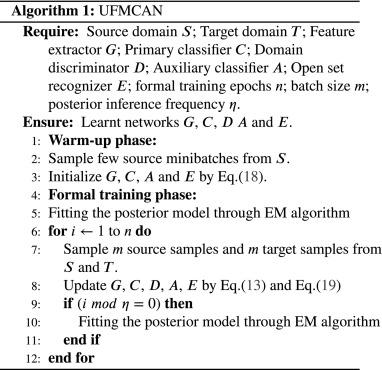当前位置:
X-MOL 学术
›
Image Vis. Comput.
›
论文详情
Our official English website, www.x-mol.net, welcomes your feedback! (Note: you will need to create a separate account there.)
Enhancing open-set domain adaptation through unknown-filtering multi-classifier adversarial network
Image and Vision Computing ( IF 4.7 ) Pub Date : 2024-03-21 , DOI: 10.1016/j.imavis.2024.104993 Qing Tian , Yi Zhao , Wangyuchen Wu , Jixin Sun
Image and Vision Computing ( IF 4.7 ) Pub Date : 2024-03-21 , DOI: 10.1016/j.imavis.2024.104993 Qing Tian , Yi Zhao , Wangyuchen Wu , Jixin Sun

|
Domain adaptation is a fundamental research problem that aims to address the domain shift issue during the transfer of a model from a labeled source domain to an unlabeled target domain. In traditional domain adaptation scenarios, it is assumed that the class spaces of both the source and target domains are identical. However, real-world applications often entail situations where the target domain contains private classes that are absent in the source domain. Forcing the alignment of these two domains may result in negative transfer. This specific concern is addressed by the emerging field of Open-set Domain Adaptation (OSDA). Previous OSDA methods attempted to align the known classes between the source and target domains while separating the unknown samples. However, these methods are inadequate in effectively discerning instances from the unknown classes. Therefore, we propose Enhancing Open-Set Domain Adaptation through Unknown-Filtering Multi-Classifier Adversarial Network (UFMCAN), which leverages multiple classifiers including a weighted auxiliary classifier, an open-set recognizer, a primary classifier and a three-way domain discriminator through adversarial learning to effectively filter instances from the unknown classes present in the target domain while concurrently aligning the source and target-known distribution. Experiments on extensive benchmarks (Office-31, Office-Home, VisDA-2017 and Office-Mix) demonstrate the superior performance of UFMCAN compared to existing state-of-the-art methods.
中文翻译:

通过未知过滤多分类器对抗网络增强开放集域适应
域适应是一个基础研究问题,旨在解决模型从标记源域转移到未标记目标域期间的域转移问题。在传统的域适应场景中,假设源域和目标域的类空间相同。然而,现实世界的应用程序通常会遇到这样的情况:目标域包含源域中不存在的私有类。强制这两个域的对齐可能会导致负迁移。开放集域适应(OSDA)这一新兴领域解决了这一具体问题。以前的 OSDA 方法尝试在分离未知样本的同时对齐源域和目标域之间的已知类别。然而,这些方法不足以有效地区分未知类中的实例。因此,我们提出通过未知过滤多分类器对抗网络(UFMCAN)增强开放集域适应,该网络利用多个分类器,包括加权辅助分类器、开放集识别器、主分类器和三路域鉴别器对抗性学习可以有效地从目标域中存在的未知类中过滤实例,同时对齐源和目标已知分布。在广泛的基准测试(Office-31、Office-Home、VisDA-2017 和 Office-Mix)上进行的实验证明,与现有最先进的方法相比,UFMCAN 具有卓越的性能。
更新日期:2024-03-21
中文翻译:

通过未知过滤多分类器对抗网络增强开放集域适应
域适应是一个基础研究问题,旨在解决模型从标记源域转移到未标记目标域期间的域转移问题。在传统的域适应场景中,假设源域和目标域的类空间相同。然而,现实世界的应用程序通常会遇到这样的情况:目标域包含源域中不存在的私有类。强制这两个域的对齐可能会导致负迁移。开放集域适应(OSDA)这一新兴领域解决了这一具体问题。以前的 OSDA 方法尝试在分离未知样本的同时对齐源域和目标域之间的已知类别。然而,这些方法不足以有效地区分未知类中的实例。因此,我们提出通过未知过滤多分类器对抗网络(UFMCAN)增强开放集域适应,该网络利用多个分类器,包括加权辅助分类器、开放集识别器、主分类器和三路域鉴别器对抗性学习可以有效地从目标域中存在的未知类中过滤实例,同时对齐源和目标已知分布。在广泛的基准测试(Office-31、Office-Home、VisDA-2017 和 Office-Mix)上进行的实验证明,与现有最先进的方法相比,UFMCAN 具有卓越的性能。



























 京公网安备 11010802027423号
京公网安备 11010802027423号